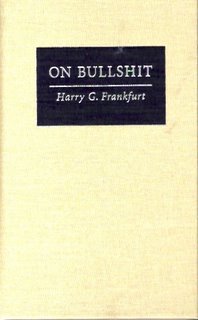 On Bullshit by Harry Frankfurt,,.tries to ask some of the preliminary questions--to define the nature of a thing recognized by all but understood by none. He explores the cultural impact of bullshit and its difference from outright lies. He looks at the philosophical implications of it and how its left the citizenry cynical of those who specialize in it: advertisers, public relations, and politicians. Bullshit is now such a dominant feature of most culture and most of us are confident we can recognize and rebuff it. But Book shows just how insidious (and destructive) it can be.
On Bullshit by Harry Frankfurt,,.tries to ask some of the preliminary questions--to define the nature of a thing recognized by all but understood by none. He explores the cultural impact of bullshit and its difference from outright lies. He looks at the philosophical implications of it and how its left the citizenry cynical of those who specialize in it: advertisers, public relations, and politicians. Bullshit is now such a dominant feature of most culture and most of us are confident we can recognize and rebuff it. But Book shows just how insidious (and destructive) it can be.Like the documentary film Stupidity, Harry attempts to investigate what most won't: That bullshit is a mechanism that is essential to society because we've made it that way, not because it is by virtue of being.
The book goes through the many variations of bullshit and its child expressions, such as bull sessions, shooting the bull and just plain bull.
"One of the most salient features of our culture is that there is so much bullshit. Everyone knows this. Each of us contributes his share. But we tend to take the situation for granted. ... In consequence, we have no clear understanding of what bullshit is, why there is so much of it, or what functions it serves. And we lack a conscientiously developed appreciation of what it means to us. In other words, we have no theory."Bullshitters seek to convey a certain impression of themselves without being concerned about whether anything at all is true. They quietly change the rules governing their end of the conversation so that claims about truth and falsity are irrelevant.
Frankfurt's conclusion . . . is that bullshit is defined not so much by the end product as by the process by which it is created. Although bullshit can take many innocent forms, excessive indulgence in it can eventually undermine the practitioner's capacity to tell the truth in a way that lying does not. Liars at least acknowledge that it matters what is true.
Harry remains the stuffy back-of-the-coffee-shop philosopher, and never comes out swinging. Reading the book felt like I was reading a preface—and not the best one either. I hate prefaces, especially when reading philosophy; they tend to be needlessly lengthy, pompous and pedantic.
On Bullshit serves as a gentle and straightforward demystification of the contemporary analytic philosopher's task.
No comments:
Post a Comment